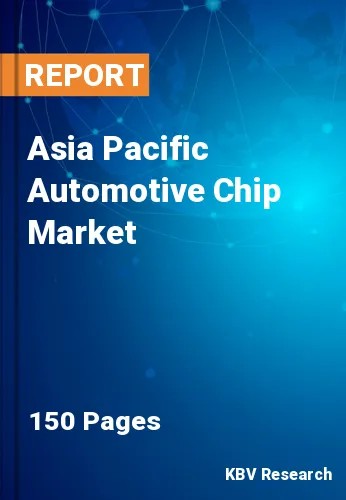Chapter 1. Market Scope & Methodology
1.1 Market Definition
1.2 Objectives
1.3 Market Scope
1.4 Segmentation
1.4.1 Asia Pacific Automotive Chip Market, by Type
1.4.2 Asia Pacific Automotive Chip Market, by Application
1.4.3 Asia Pacific Automotive Chip Market, by Vehicle
1.4.4 Asia Pacific Automotive Chip Market, by Country
1.5 Methodology for the research
Chapter 2. Market at a Glance
2.1 Key Highlights
Chapter 3. Market Overview
3.1 Introduction
3.1.1 Overview
3.1.1.1 Market Composition and Scenario
3.2 Key Factors Impacting the Market
3.2.1 Market Drivers
3.2.2 Market Restraints
3.2.3 Market Opportunities
3.2.4 Market Challenges
Chapter 4. Competition Analysis - Global
4.1 KBV Cardinal Matrix
4.2 Recent Industry Wide Strategic Developments
4.2.1 Partnerships, Collaborations and Agreements
4.2.2 Product Launches and Product Expansions
4.2.3 Acquisition and Mergers
4.3 Market Share Analysis, 2023
4.4 Top Winning Strategies
4.4.1 Key Leading Strategies: Percentage Distribution (2020-2024)
4.4.2 Key Strategic Move: (Partnerships, Collaborations and Agreements: 2021, Feb – 2024, Aug) Leading Players
4.5 Porter Five Forces Analysis
Chapter 5. Asia Pacific Automotive Chip Market by Type
5.1 Asia Pacific Microcontrollers & Microprocessors Market by Country
5.2 Asia Pacific Analog ICs Market by Country
5.3 Asia Pacific Logic ICs Market by Country
5.4 Asia Pacific Sensor Market by Country
5.5 Asia Pacific Others Market by Country
Chapter 6. Asia Pacific Automotive Chip Market by Application
6.1 Asia Pacific Telematics & Infotainment Market by Country
6.2 Asia Pacific Safety Market by Country
6.3 Asia Pacific Powertrain Market by Country
6.4 Asia Pacific Body Electronics Market by Country
6.5 Asia Pacific Chassis Market by Country
Chapter 7. Asia Pacific Automotive Chip Market by Vehicle
7.1 Asia Pacific Passenger Vehicles Market by Country
7.2 Asia Pacific Commercial Vehicles Market by Country
Chapter 8. Asia Pacific Automotive Chip Market by Country
8.1 China Automotive Chip Market
8.1.1 China Automotive Chip Market by Type
8.1.2 China Automotive Chip Market by Application
8.1.3 China Automotive Chip Market by Vehicle
8.2 Japan Automotive Chip Market
8.2.1 Japan Automotive Chip Market by Type
8.2.2 Japan Automotive Chip Market by Application
8.2.3 Japan Automotive Chip Market by Vehicle
8.3 India Automotive Chip Market
8.3.1 India Automotive Chip Market by Type
8.3.2 India Automotive Chip Market by Application
8.3.3 India Automotive Chip Market by Vehicle
8.4 South Korea Automotive Chip Market
8.4.1 South Korea Automotive Chip Market by Type
8.4.2 South Korea Automotive Chip Market by Application
8.4.3 South Korea Automotive Chip Market by Vehicle
8.5 Singapore Automotive Chip Market
8.5.1 Singapore Automotive Chip Market by Type
8.5.2 Singapore Automotive Chip Market by Application
8.5.3 Singapore Automotive Chip Market by Vehicle
8.6 Malaysia Automotive Chip Market
8.6.1 Malaysia Automotive Chip Market by Type
8.6.2 Malaysia Automotive Chip Market by Application
8.6.3 Malaysia Automotive Chip Market by Vehicle
8.7 Rest of Asia Pacific Automotive Chip Market
8.7.1 Rest of Asia Pacific Automotive Chip Market by Type
8.7.2 Rest of Asia Pacific Automotive Chip Market by Application
8.7.3 Rest of Asia Pacific Automotive Chip Market by Vehicle
Chapter 9. Company Profiles
9.1 NXP Semiconductors N.V.
9.1.1 Company Overview
9.1.2 Financial Analysis
9.1.3 Regional Analysis
9.1.4 Research & Development Expenses
9.1.5 Recent strategies and developments:
9.1.5.1 Partnerships, Collaborations, and Agreements:
9.1.5.2 Product Launches and Product Expansions:
9.1.6 SWOT Analysis
9.2 Infineon Technologies AG
9.2.1 Company Overview
9.2.2 Financial Analysis
9.2.3 Segmental and Regional Analysis
9.2.4 Research & Development Expense
9.2.5 Recent strategies and developments:
9.2.5.1 Partnerships, Collaborations, and Agreements:
9.2.6 SWOT Analysis
9.3 Texas Instruments, Inc.
9.3.1 Company Overview
9.3.2 Financial Analysis
9.3.3 Segmental and Regional Analysis
9.3.4 Research & Development Expense
9.3.5 Recent strategies and developments:
9.3.5.1 Partnerships, Collaborations, and Agreements:
9.3.5.2 Product Launches and Product Expansions:
9.3.6 SWOT Analysis
9.4 STMicroelectronics N.V.
9.4.1 Company Overview
9.4.2 Financial Analysis
9.4.3 Segmental and Regional Analysis
9.4.4 Research & Development Expenses
9.4.5 Recent strategies and developments:
9.4.5.1 Partnerships, Collaborations, and Agreements:
9.4.5.2 Acquisition and Mergers:
9.4.6 SWOT Analysis
9.5 Renesas Electronics Corporation
9.5.1 Company Overview
9.5.2 Financial Analysis
9.5.3 Segmental and Regional Analysis
9.5.4 Research & Development Expense
9.5.5 Recent strategies and developments:
9.5.5.1 Partnerships, Collaborations, and Agreements:
9.5.5.2 Acquisition and Mergers:
9.5.6 SWOT Analysis
9.6 ON Semiconductor Corporation
9.6.1 Company Overview
9.6.2 Financial Analysis
9.6.3 Segmental and Regional Analysis
9.6.4 Research & Development Expense
9.6.5 Recent strategies and developments:
9.6.5.1 Product Launches and Product Expansions:
9.6.5.2 Acquisition and Mergers:
9.6.6 SWOT Analysis
9.7 Qualcomm Incorporated (Qualcomm Technologies, Inc.)
9.7.1 Company Overview
9.7.2 Financial Analysis
9.7.3 Segmental and Regional Analysis
9.7.4 Research & Development Expense
9.7.5 Recent strategies and developments:
9.7.5.1 Partnerships, Collaborations, and Agreements:
9.7.6 SWOT Analysis
9.8 Intel Corporation
9.8.1 Company Overview
9.8.2 Financial Analysis
9.8.3 Segmental and Regional Analysis
9.8.4 Research & Development Expenses
9.8.5 Recent strategies and developments:
9.8.5.1 Partnerships, Collaborations, and Agreements:
9.8.5.2 Acquisition and Mergers:
9.8.6 SWOT Analysis
9.9 ROHM Co., Ltd.
9.9.1 Company Overview
9.9.2 Financial Analysis
9.9.3 Segmental and Regional Analysis
9.9.4 Research & Development Expense
9.9.5 Recent strategies and developments:
9.9.5.1 Partnerships, Collaborations, and Agreements:
9.9.6 SWOT Analysis
9.10. Microchip Technology Incorporated
9.10.1 Company Overview
9.10.2 Financial Analysis
9.10.3 Segmental and Regional Analysis
9.10.4 Research & Development Expenses
9.10.5 SWOT Analysis

